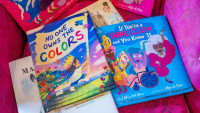
It’s About Time!
altaonline.com – Wednesday September 20, 2023

Heed the advice of some literary heavyweights to create an ideal writing routine.
The perfect writing routine! Every writer dreams of it, and every writer knows, deep down, that there is no such thing. There are simply too many variables at play—ambition, temperament, material circumstances—to reach a one-size-fits-all solution. But! Could one identify the building blocks of the perfect routine, to be applied to individual writing practices on an ad hoc basis? Here is an attempt, with copious supporting examples.
RULE NO. 1: SCHEDULE DISCRETE FOCUS BLOCKS
Writers with day jobs may fantasize about having long expanses of unstructured creative time, but let’s be honest: there is no greater drag upon a writing practice than having the full day available for it, which practically guarantees a long, flabby drift rather than a focused effort.
In a practice that is all about increments of labor, the first step is to define your daily dose.

Reilly appointed literary agent at Colwill & Peddle
thebookseller.com – Wednesday September 20, 2023

Milly Reilly has joined Colwill & Peddle as a literary agent. She brings with her a list of non-fiction and literary fiction authors, including Dr Annabel Sowemimo, Gabrielle de la Puente and Zarina Muhammad, among others.
Reilly started her career at First Story before joining Jo Unwin Literary Agency in 2017, originally as Unwin’s assistant. She said: "Kay and Charlotte are phenomenal agents. Their transparent and collaborative ethos is a force for good in the industry, and I’m delighted to be joining their agency.
"I am so grateful to Jo and the wider team – Rachel, Donna and Daisy – for my time at JULA, and all that I’ve learnt at the company. It has been a joy and privilege to work with such intelligent and inspiring colleagues, and I will miss them very much."

Seager and Maidment promoted at Madeleine Milburn
thebookseller.com – Tuesday September 19, 2023

Chloe Seager has been promoted to director of Children’s and YA at the Madeleine Milburn Literary Agency (MMA). Moreover, Olivia Maidment has been moved up to the newly created position of head of books, working closely with the directors to implement strategy.
Seager has been at MMA since April 2019, regularly negotiating six- or seven-figure deals for her clients in the UK and the US. Her authors include Katie Kirby, Anna Fargher, Jo Harwood and Kathryn Foxfield. She also represents authors including Maisie Chan, winner of the Jhalak Prize and Branford Boase and Danielle Jawando, winner of the YA Book Prize, among others.
Since Seager’s arrival at the agency, her authors have also bagged five Waterstones Children’s Book of the Month slots, one Indie Children’s Book of the Month Slot and one Barnes & Noble Book of the Month slot.

Traditional Publishing in the 2020s
By G. Miki Hayden
Instructor at Writer's Digest University online and private writing coach
firstwriter.com – Friday September 15, 2023

Don’t abandon all hope ye who want to enter into traditional publishing this decade, but you might consider changing what you’re looking for.
I recently had an article covering self-publishing on this site, for which I interviewed some writers who have been self-publishing. I wanted then to discuss what we call “traditional publishing” and thought about who I might interview for such a piece.
Indeed, I know people who publish traditionally, but the idea of interviewing most seemed useless because they have been putting out their books in the mainstream for quite a while, decades in some cases. Talking to them wouldn’t give the great majority of us who wish we were in their shoes much information. And much of traditional publishing still follows the same model, but it has changed.
So let’s start with what traditional publishing is. The authors are the supplicants, first-off to gain an agent who knows the publishers and their needs and will sell for the selected clients.

I am in Print launches £1,000 writing prize with Canelo
thebookseller.com – Thursday September 14, 2023

The I Am In Print events brand has partnered with independent publisher Canelo to host its inaugural Novel Award for unagented writers of unpublished adult fiction worth £1,000.
The prize, sponsored and judged by digital publisher Canelo, is open to writers globally and entries for completed manuscripts, written in English and across eight genres. The first prize includes £1,000 and a one-hour online consultation with a Canelo editor.
Additionally low-income writers can enter for free, and those who fall within underrepresented groups and members of the I Am In Print writing community The Writing Sphere, may receive a 50% discount upon application. Submissions close on 9th October at 10 a.m.
As part of the award entry ticket, access to a selection of masterclasses will be offered by Canelo on 30th November. The winners will be announced publicly at this live event.

UK Publishers And Literary Agents Reportedly Uninterested In Working With White Or Straight Writers: “BIPOC, Queer And Minority Groups Are Always The Most Welcome”
boundingintocomics.com – Thursday September 14, 2023

According to a new report, a number of UK-based publishers and literary agents have taken to publicly announcing that rather than any white and/or straight authors, they would almost exclusively prefer to work with those who come from ‘underrepresented’ demographic groups.
This information was first brought to public attention by UK news outlet The Telegraph, whose investigation into the matter identified four publishing houses whose public facing materials promoted this rhetoric.
One such publisher was Ash Literary, the children’s book specialists perhaps best known for producing the Marv series, who on the ‘Submissions‘ section of their official website inform prospective writers that “We are actively seeking voices that have historically been underrepresented, particularly with tropes that are often said to be ‘over done’.”
“For example, we are not interested in stories about white able bodied WW2 evacuees but would welcome that story from a disabled, LGBTQ+ or BIPOC perspective,” they add. “If your book is about an identity that is not yours, we will not be a good fit. This includes books based the experiences of family members and friends.”

Simpson joins Paper Literary as subsidiary rights and literary agent
thebookseller.com – Thursday September 14, 2023

Jenny Simpson, previously at CAA, has joined Paper Literary as a subsidiary rights and literary agent. She joins founder Catherine Cho, agent Katie Greenstreet and editorial consultant Melissa Pimentel.
Simpson began her publishing career at ICM Partners in New York in the subsidiary rights department. She was promoted to agent in 2021, handling all domestic subsidiary rights on behalf of the department, with a focus on audiobook and first serial rights.
She has negotiated and sold rights at significant six-figure levels on behalf of prize-winning and bestselling authors and journalists. During her time at ICM (now CAA), Simpson worked across the publishing and podcasting departments, servicing clients in their ventures into the original audio and podcast marketplaces.

New Literary Agent Listing: Jack Mozley
firstwriter.com – Thursday September 14, 2023

The son of a mining engineer and a poet, I naturally ended up with a doctorate in quantum physics and a love of Science Fiction, each using, as they do, a little of the extraordinary to understand the everyday.
SF’s capacity to disrupt and subvert dominant perspectives is central to why I fell for it, and I encourage submissions from writers from underrepresented backgrounds.
What I look for above all else is the visceral impact of a story which leaves you changed. I first found this, in distilled form, in 2000AD Future Shocks, particularly those by Alan Moore, and I appreciate anything holding a Black Mirror up to our world, and to ourselves.

To hell with woke publishers
spiked-online.com – Wednesday September 13, 2023

The gatekeepers of the creative industry are riddled with a nasty strain of identity politics.
ASH Literary is on the hunt for budding children’s book authors. ‘We are actively seeking voices that have historically been underrepresented’, the submissions section of the agency’s website tells us. ‘For example, we are not interested in stories about white, able-bodied [Second World War] evacuees, but would welcome that story from a disabled, LGBTQ+ or BIPOC [black, indigenous or people of colour] perspective’, it explains.
Leaving aside for a moment the big question of what on Earth the term ‘indigenous’ could possibly mean in a British context, this reads like a sophomoric parody of the modern publishing industry. But I’m afraid it is real. And when we stop laughing at the thought of a blue-haired ‘nonbinary’ stepping nervously off a train at a remote rural station in 1940 – which would be rather like Neville Chamberlain bopping along to some Chiptune – there is something quite troubling about this stuff, uncovered among other examples by Charlotte Gill in the Sunday Telegraph.
The nub of things comes a little later on the same page of the ASH agency’s site, which reads: ‘If your book is about an identity that is not yours, we will not be a good fit.’ What a grim traducement of the power and the purpose of literature – of humanity, even – that nasty little sentence is.

New Literary Agent Listing: Alyssa Maltese
firstwriter.com – Tuesday September 12, 2023

In the YA space, I’m seeking fiction that helps young readers discover their own voice and sense of self-worth. I love kids and have a background in early childhood education, and feel strongly that if a child is old enough to experience something, then they are old enough to read about it. I’m particularly drawn to contemporary coming-of-age stories with a healthy dose of angst. I’m open to genre elements (particularly speculative, fantasy, romance, historical), but in general I prefer fiction grounded in our world, so I’m not the best fit for straightforward fantasy. I’m also seeking YA horror. In this space, I love high stakes and work embedded with social commentary. I would be absolutely tickled to find a YA project exploring 2000s emo culture. (It’s not a phase, mom!) If your book is set at Warped Tour or Bamboozle, I want to see it! In adult fiction, I’m casting a bit of a wider net. I’m looking for weird upmarket speculative novels. I’m also seeking commercial psychological thrillers, domestic suspense, and horror. Propulsive pacing is a must, and twists that really surprise me are a bonus! My very favorite kind of historical fiction is slice-of-life revealing untold stories of interesting women. I’d also love some romance to round out my list. One of my favorite tropes is when love is reciprocated, but one or both love interests doesn’t realize it... think enemies to lovers; best friends to lovers; sunshine and grumpy. My ideal romance is torturously slow burn with a healthy dose of angst and substantial emotional growth. Lastly in the adult fiction space, I’m seeking commercial/upmarket book club fiction. In adult nonfiction, I’m seeking prescriptive and research-driven narrative nonfiction from authors with an established expertise and audience. Topics of interest in nonfiction include psychology, mental health, taboo topics such as death and sex, science pertaining to nature and animals, and pop culture. I am not accepting submissions for poetry, short story collections, screenplays, novellas, early reader books, chapter books, religious texts, picture books, graphic novels, or illustrations of any kind. I am not the best fit for high/epic fantasy, space operas, paranormal romance, crime fiction/detective novels, cozy mysteries, legal thrillers, romantic thrillers, pulp fiction, sick lit, stories set in mental hospitals, most things related to sports, grifter-themed stories, torture porn/gratuitous gore, or fairytale retellings (though I do have a soft spot for Arthurian legend).
Get the free newsletter | Submit a news item or article | Get Writers' News for your website





